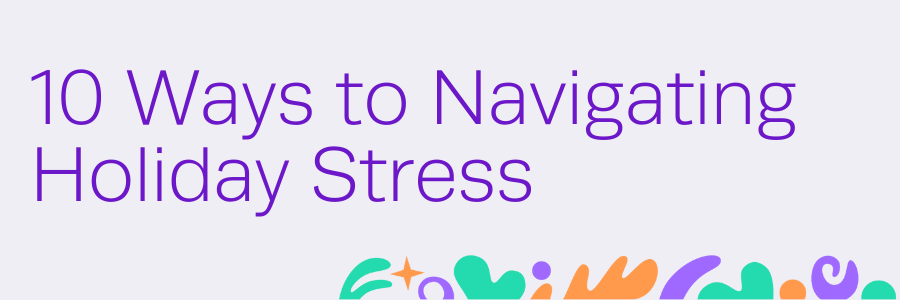10 Ways to Navigating Holiday Stress

The holiday season, often synonymous with joy and celebration, can also be a challenging time. A survey conducted by the National Alliance on Mental Illness (NAMI) indicated that 72% of mental health professionals reported increased stress during the holiday months compared to other times of the year. Balancing the demands of work with personal life during this season requires a proactive approach to self-care and stress management. Here are ten effective strategies to help behavioral health professionals maintain their mental well-being during the holidays!
- Prioritize Self-Care: Research has shown that 60% of behavioral health professionals struggle to maintain a consistent self-care routine during the holiday season, leading to increased burnout rates and decreased job satisfaction. Ensure you’re getting enough sleep, engaging in regular physical activity, and consuming a balanced diet. Don’t hesitate to schedule time for relaxation and hobbies, as they can serve as powerful stress relievers.
- Establish Boundaries: A study published in the Journal of Occupational Health Psychology highlighted that 80% of professionals in the mental health field face challenges in maintaining work-life balance during the holiday season, leading to heightened stress levels and decreased productivity. Setting clear boundaries is essential. Learn to say no to extra commitments that may overwhelm you. Communicate your availability to colleagues and clients, and make sure to allocate time for your own well-being.
- Utilize Behavioral Health Software Tools: According to a recent industry report, the adoption of behavioral health software solutions has led to a 35% increase in overall efficiency among professionals in the behavioral health industry, allowing them to focus more on patient care and less on administrative tasks during the holiday season. By automating routine tasks, you can dedicate more time to meaningful interactions with your clients.
- Foster a Supportive Work Environment: Studies have shown that a supportive work environment can reduce stress levels by 45% during the holiday season, enhancing job satisfaction and promoting a sense of belonging within the workplace. Encourage open communication and provide opportunities for team members to share their experiences and challenges. A strong support system can alleviate stress and create a sense of community during the holiday season.
- Practice Mindfulness: Incorporate mindfulness practices into your daily routine. Whether it’s through meditation, deep breathing exercises, or mindfulness-based activities, these techniques can help you stay grounded and focused. Research published in the Journal of Clinical Psychology suggests that mindfulness-based interventions can significantly reduce stress and anxiety levels by up to 50% among behavioral health professionals, enabling them to maintain a clear and focused mindset during the holiday season.
- Encourage Professional Development: Stay updated with the latest advancements in the behavioral health industry. Attend workshops, webinars, and conferences to enhance your knowledge and skills. Engaging in continuous learning not only benefits your professional growth but also contributes to a sense of fulfillment and purpose.
- Seek Supervision and Consultation: Don’t hesitate to seek supervision or consultation from senior professionals or mentors. Discussing challenging cases or work-related concerns with experienced peers can provide valuable insights and support, enabling you to approach your work with a renewed perspective.
- Promote Work-Life Balance: Strive to maintain a healthy balance between work and personal life. Allocate specific time slots for work-related tasks and adhere to them strictly. Reserve quality time for family and friends to foster meaningful connections and create cherished memories during the holiday season.
- Reflect and Reassess Goals: Take time to reflect on your professional journey and reassess your goals. Identify areas for personal and professional growth, and set realistic objectives for the upcoming year. Celebrate your achievements and acknowledge the progress you’ve made in your career within the behavioral health industry.
- Emphasize Gratitude: Embrace an attitude of gratitude and appreciation. Recognize the positive impact you’ve had on the lives of others and express gratitude for the opportunity to make a meaningful difference. Cultivating a sense of gratitude can uplift your spirits and enhance your overall well-being.
The holiday season can be a time of both joy and stress, especially for professionals in the behavioral health industry. By implementing these effective strategies, supported by the latest statistics and research findings, you can navigate the challenges with resilience and maintain your mental well-being. Remember, your well-being is paramount to your ability to serve others effectively.
Recent Posts
Rely on Kipu to keep you ahead of change.
Subscribe to Kipu for behavioral health news, updates, community celebration, and product announcements.



